Verbena, Vervain, Ma Bian Cao 马鞭草Sacra Herba, Sideritis, Herba Sanguinalis, ColumbinaMa Bian Cao (TCM) |
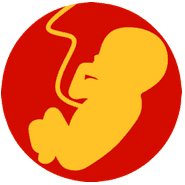
|
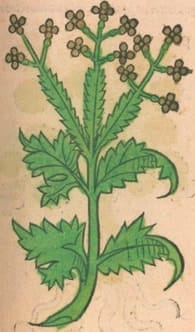 Ortus Sanitatis, Meydenbach, 1491
Ortus Sanitatis, Meydenbach, 1491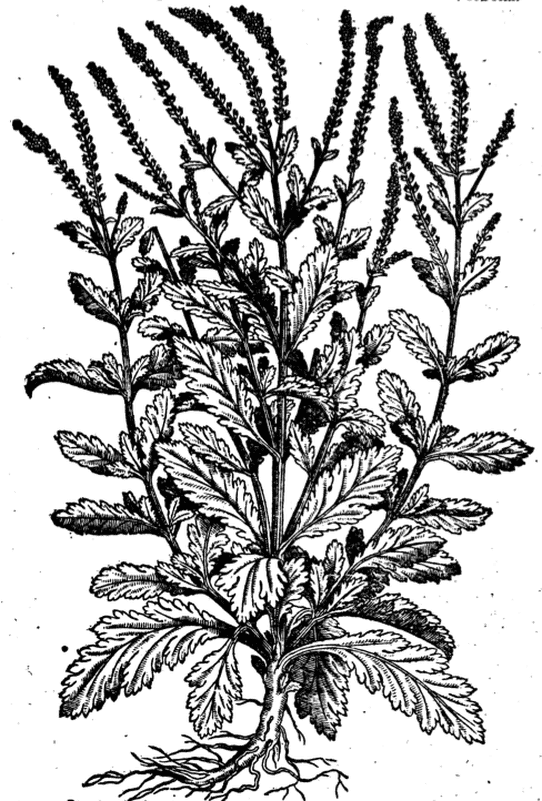 New Kreuterbuch, Matthiolus, 1563
New Kreuterbuch, Matthiolus, 1563
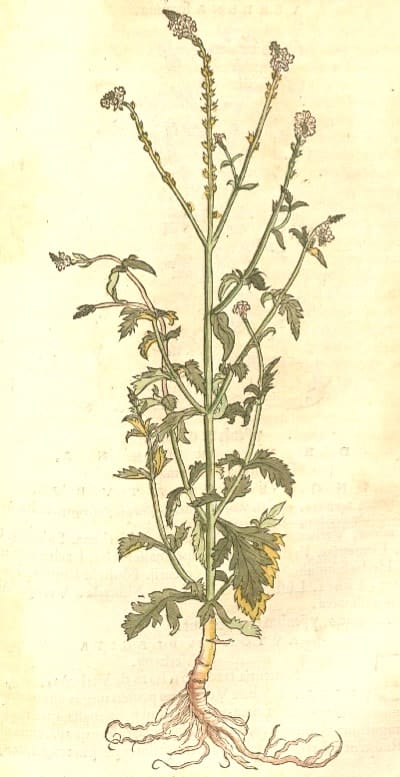
|
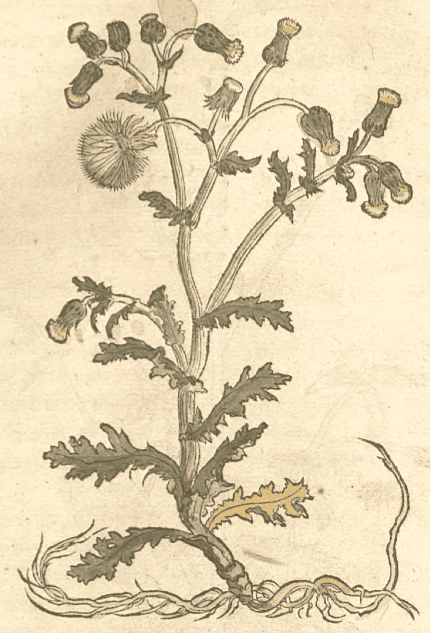
Male Vervain (left) and Female Vervain (above) Herbarum Vivae Eicones, Otto Brunfels, 1530 |
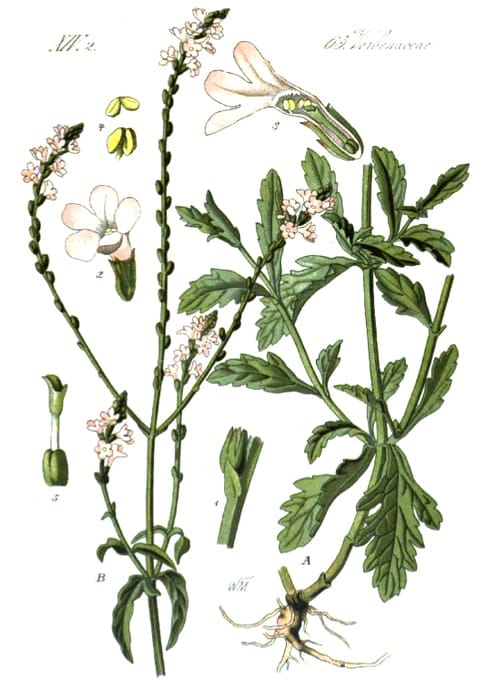 Flora von Deutschland (19), Kohler, 1884
Flora von Deutschland (19), Kohler, 1884Botanical name:
Verbena officinalis
Several different varieties are used including ‘Male’ and ‘Female’
Parts used:
Root, herb in flower
Temperature & Taste:
Neutral, dry (Salmon). Bitter, Pungent
Considered Cool in older TCM texts.
Classifications:
2D ATTENUATERS OF CONGEALED BLOOD. 2F. PURIFYING. 2T. GLUTINATE
4b. OPTHALMIC
TCM:
K. Move the Blood
Uses:
1. Clears Wind and Heat, Resists Poison, Promotes Sweat: (West, TCM)
-Colds, Flu, as well as Epidemic, Malignant and Pestilential Fevers
-Sore Throat, Diphtheria
-Measles, Small Pox, other Eruptive Fevers
-various types of Fever including Intermittent and Malarial Fevers; Gerard said it is of ‘singular force against the Tertian and Quartan fevers’
-chronic Malaria (TCM)
-Abscesses, Toxic Sores, Gingivitis
-various Poisons, but especially against Venomous bites.
2. Clears Heat and Toxin, Resolves Swellings: (West, TCM):
-abscess of the Breast, Mastitis, Scrofula
-Cholecystitis, Jaundice, abdominal Tumors, Hepatitis, Liver Cirrhosis, Ascites and Splenomegaly
-Cancer, including of the Liver and Ovaries.
-‘good for dissolving hard mass’. (Ben Cao Gang Mu)
3. Moves the Blood, Promotes Menstruation: (West, TCM)
-‘Excellent for the Womb’ (Culpeper)
-Amenorrhea and Dysmenorrhea.
-promote Labor, taken in wine
–promote Fertility, and has traditionally been said to have Aphrodisiac qualities.
-during Menopause to relieve symptoms
-TCM has used it for morbid Leukorrhea.
-‘eliminates swelling of the male genitalia’ (Li Shi Zhen)
4. Clears Wind, Calms the Liver, Moves the Blood:
-specific for Headaches; used for Tension Headaches, Liver Headaches, Headaches from Blood Stagnation and Migraines
-Toothache, Facial Neuralgia
-calms and promotes rest in Insomnia and is effective for Depression and Nervousness.
-Traditionally used for Epilepsy, Apoplexy, Paralysis and Insanity.
5. Kills Worms: (West, TCM)
-kills and expels Worms.
6. Promotes Urine, Clears Gravel and Stones: (West, TCM)
-nephritic Edema, Oliguria.
-Gout, Gravel and Stones.
-used as an auxiliary for Diabetes
7. Clears Phlegm and Heat, Stops Cough and Wheezing: (West, TCM)
–heat-types of Coughs including Whooping Cough;
-Wheezing, shortness of Breath, Asthma
-‘Lung Ulcers’, Spitting of Blood, Pneumonia and Consumption.
8. Externally:
-poultices or plasters for Headache, Toothache, Rheumatic pain
-topically to move the Blood, ease Pain, and clear Bruising
-poultices, plasters, compress and washes for Sprains, Swellings, Sores, Wounds, Abscesses, Boils, Skin Inflammations and Tumors.
-applied with honey to Ulcers of the Leg
-gargle for Sores and Ulcers of the Mouth and Throat.
-ointment with Lard is applied to pain and swelling of the Genitals, especially in women.
-fresh herb is stamped with Oil of Roses and vinegar and applied to stop Falling Hair. The juice has been massaged into the scalp for all
-diseases of the hair including baldness and thinning.
-decoction or distilled water as as eye drops for weak, red, sore Eyes, and poor Eyesight.
Dose:
INFUSION or BRIEF DECOCTION: 3–9 grams, up to 15 or 20 grams daily. In TCM, up to 30 grams is sometimes used in Decoction in stubborn or severe conditions, and 60–150 grams of the fresh herb is decocted for use in Malaria;
TINCTURE (1:5 in 40% alcohol): 2–5, 7, to 10 mls, up to 12 or 15 mls, 2–3 times daily;
FLUID EXTRACT (25%): 1–4 mls;
POWDER: 500mg–3 or 4 grams.
Used externally in washes, baths, plasters, poultices, enemas, douches etc.
Main Combinations:
Betony & Vervain
1. Fever:
i. Vervain with Willow bark
ii. Vervain with China root, Bitter Orange, Cinnamon (Inverni)
2. Spotted Fevers, Small Pox, Vervain with Sage, Safflower, Peppermint, Pitchers Plant, Calendula (The Medical Herbalist)
3. Scarlet Fever, Vervain with Ground Ivy, Sage, Centaury
4. Viral Infections, Vervain with Rue, Plantain, Sage, Wormwood, Balm, Betony, Centaury, St. John’s Wort (as in Powder Against Rabies)
5. Malaria, decoct 30 grams of Vervain and take 2–4 hours before the Malarial Fever. (TCM)
6. Headache, Migraine:
i. Vervain with Betony
ii. Vervain with Betony, Feverfew, Balm, St Johns wort
iii. Vervain with Betony, Horehound and Hyssop
7. Epilepsy, Vervain with Peony (Albertus)
8. Amenorrhea, Dysmenorrhea:
i. Vervain, Motherwort (Yi Mu Cao), Cyperus rotundus Xiang Fu
ii. Vervain with Motherwort, Pennyroyal, Mugwort, Balm (as in Decoction for the Womb)
9. Abdominal Masses, Vervain with Zedoary (E Zhu), Sparganium San Leng (TCM)
10. Anemia, Chlorosis, Vervain with Chicory, Dandelion, Shepherds Purse, Centuary, Walnut leaf (Finsterwalder)
11. Jaundice with spleen congestion, Vervain with Veronica, Wormwood, Agrimony, Horsetail, Chicory, Dandelion (Görgens)
12. Diabetes from Heat, Vervain with Nettle root and Caraway (as in Decoction for Diabetes from Heat)
13. Stones, Betony, Vervain, Yarrow (Pliny)
14. Ascites, Vervain with Artemisia anomala Liu Ji Nu, Lobelia chinensis Ban Bian Lian (TCM)
15. Ulcers and Abscesses, Vervain with Dandelion and Violet
16. Abscesses and Hard Swellings, Vervain boiled in vinegar and applied (Pliny)
17. Breast Swellings, Vervain with Agrimony and Betony (The Physicians of Myddvai)
18. Trauma, Bruising:
i. Vervain, Myrrh (Mo Yao), Frankincense (Ru Xiang), Safflower (Hong Hua) (TCM)
ii. Vervain with Tormentil, Comfrey, Shilajit, Wintergreen, St. Johns wort (as in Universal Vulnerary Decoction)
19. Poor and Weak Eyesight:
i. Vervain with Celandine, Eyebright, Aloe and Zinc oxide as eye drops (Riverius)
ii. Vervain with Senna, Fennel, Betony, Eyebright, Rosemary (as in Powder to Cleanse the Sight)
Major Formulas:
Betony Infusion Compound
Decoction for the Womb
Decoction for Diabetes from Heat
Decoction to Cleanse the Sight (Riverius)
Powder Against Rabies
Powder to Cleanse the Sight
Powder Against Rabies
Universal Vulnerary Decoction
Water of Emperor Frederick for the Sight
Cautions:
1. Not used during Pregnancy
2. Use cautiously in weak and blood-deficient patients.
Main Preparations used:
Distilled Water of the Herb, Ointment of Vervain
From HERBARIUM of APULEIUS.
i. For Wounds and Carbuncles and Glandular Swellings
ii. Again, for kernels or Glandular Swellings
iii. For those that have obstructed veins so that the blood cannot have its natural course, and for those that may not retain their food.
iv. For sore of Liver
v. For the infirmity in which Stones grow in the Bladder
vi. For Head sore (Headache)
vii. For bite of Snakes
viii. For bite of attorcrop (type of flying insect)
ix. For bite of Mad Dog
x. For new Wounds
xi. For bite of Adder
(Herbarium of Apuleius c. 1050, taken out of Leechdoms, Wortcunning, and Starcraft of Early England, Rev. O. Cockayne, 1864)
